 Dental Implants — Harrisonburg, VA
Dental Implants — Harrisonburg, VA
Lifelike Replacement Teeth That Function Like Natural
 When it comes to replacing missing teeth, dental implants are in a league of their own. They offer several unique benefits that make them a top choice among patients and a popular recommendation from dentists for those suffering from tooth loss. If you’d like to learn more about this leading-edge treatment and how it can help you, call our office to schedule a consultation today!
When it comes to replacing missing teeth, dental implants are in a league of their own. They offer several unique benefits that make them a top choice among patients and a popular recommendation from dentists for those suffering from tooth loss. If you’d like to learn more about this leading-edge treatment and how it can help you, call our office to schedule a consultation today!
Why Choose Harrisonburg Family & Cosmetic Dentistry for Dental Implants?
- We Take a Collaborative Team Approach
- Additional Financing Available
- Free 30-Minute Implant Denture Consultation
What are Dental Implants?
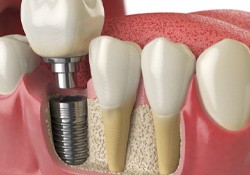
Dental implants are small, screw-like posts that are surgically placed below the gumline and into the jawbone to restore the root structure of missing teeth. Due to their biocompatible nature, they’re able to organically fuse with the bone structure to create a strong and stable foundation for any type of restoration to be attached to. This allows them to restore one, two, several, or all teeth.
The 4-Step Dental Implant Process

Dental implants have a complex treatment process, so getting them involves many steps that take a few months. Still, their long-term benefits make them worth all the time and effort! Since we rely on local specialists, the final implants are well-placed and work amazingly well with your smile. You can also expect four specific actions as part of treatment, though other details may differ. These four elements are consultation, surgery, osseointegration, and delivery of final restoration.
Initial Dental Implant Consultation

You’ll meet our dentists for a consultation before dental implant treatment starts. At this visit, we’ll learn about your treatment goals, medical history, oral health, etc. We’ll then use your feedback to see if dental implants suit you, adjusting your custom treatment plan as needed.
Please don’t worry if you fail to qualify for dental implants at first. In reality, you can become a good candidate later through preliminary services – gum disease treatment, tooth extraction, and so on. Through these procedures, your mouth would gain the strength to handle implants.
Dental Implant Surgery

Once you’re ready, we’ll refer you to local specialists for dental implant surgery. These trained surgeons have great skill and experience, so they’ll effectively place your implants. You can expect excellent results (short and long-term) from their work!
As for the actual implant surgery, it should feature:
- Anesthesia – The specialists will numb your treatment site(s) with anesthesia before surgery. By doing so, they’ll keep you from feeling pain during treatment; you’ll only sense a slight pressure instead.
- A Minor Incision – After the anesthesia is applied, the specialists will make an incision in your gums. Doing so creates space in your mouth for the dental implant.
- Implant Placement – The specialists will place your dental implant using advanced methods and tools.
- Gum Closure – When the placement is finished, the specialists will close your gum incision. They’ll then set a cap over your new implant to wrap things up.
Dental Implant Osseointegration & Abutment

Your dental implants will fuse with your jaw after surgery, slowly becoming permanent parts of your mouth. This process – osseointegration – usually takes 4-6 months and requires careful living habits. Once done, it’ll leave your new teeth very secure and stable.
Our team will perform a follow-up surgery when you’ve recovered from the fusion process. More specifically, we’ll place an abutment (i.e., a metal connector) on your dental implant. This part will secure your final restoration and hold it in place.
Delivery of Dental Implant Restoration(s)

Of course, the last phase of dental implant treatment is the delivery of the final restoration. This step places a prosthetic that “matches up” with how many teeth you’ve lost. Depending on the final tally, the restoration could be a dental crown, bridge, or implant denture.
We won’t need long to fit your restoration; we only have to apply some dental cement. From there, our team will make last-minute changes that ensure quality results. You can then go out and enjoy your full grin!
The Benefits of Dental Implants
Due to how they work, dental implants represent the gold standard of modern tooth replacement. The posts have many unique perks that dentures and dental bridges can’t match. As a result, they’re now so popular that U.S. dentists place about 500,000 of them every year! If that fact intrigues you, we’ll gladly lay out the benefits of dental implants in Harrisonburg. Simply keep reading or call our office to get the relevant details.
Day-to-Day Benefits

You’ll notice dental implants’ day-to-day perks soon after you get them. These benefits include:
- Lifelike Looks – Because they’re capped with porcelain, dental implants match your other teeth in size, color, and shape. Their titanium bases also ensure they stay secure and won’t fall out.
- Higher Confidence – Dental implants should raise your confidence once they restore your smile. From there, you’ll feel self-assured in your looks, speech, eating ability, etc.
- Easy Eating – By fusing with your jaw, dental implants restore most of your bite’s strength. This effect allows you to eat your favorite tough foods again.
- Simple Maintenance – Dental implants are easier to clean than dentures and dental bridges. More specifically, you can care for them like natural teeth through twice-daily brushing and once-daily flossing.
Health Benefits

Over time, you’ll see dental implants also have health-related benefits. These are the following:
- Better Nutrition – When they restore your bite force (see above), dental implants tend to expand your dietary choices. This wide range of food options ensures your body gets the necessary vitamins and minerals.
- A Cleaner Mouth – Untreated smile gaps are breeding grounds for harmful bacteria, so they raise your risk of tooth decay and gum disease. Luckily, dental implants fill these spaces and make your mouth healthier.
- Support for Teeth – Left unchecked, smile gaps can slowly tilt your remaining teeth until they fall out. Dental implants will prevent that outcome when they’re placed.
- A Sturdy Jaw – Tooth loss slowly erodes your jaw, putting you at risk of facial collapse and similar problems. The good news is that dental implants stop (and reverse) this erosion.
Long-term Benefits

If you take really good care of them, your dental implants will also show long-term benefits. The most notable ones are:
- High Rate of Success – When placed by a qualified dentist, dental implants tend to succeed in the long run. It’s to the point that their ten-year success rate exceeds 98%!
- Long-Lasting Effects – An average dental implant lasts 15-20 years, and well-maintained ones have lifespans of 30+ years. That means an implant treatment can help you for a lifetime!
- Cost-Effective Care – Dental implants can save you money thanks to their long lifespans (see above). They rarely need repairs or replacements and shouldn’t need costly follow-up work.
Who Dental Implants Can Help
Dental implants in Harrisonburg are an incredibly versatile solution that can help patients experiencing a spectrum of tooth loss situations. The best way to learn whether you’re a candidate is to contact our office directly to schedule a consultation with us.
Who is a Good Candidate for Dental Implants?
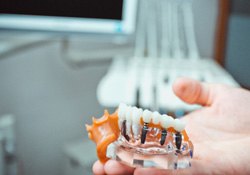
The ideal candidates for dental implants are those who:
- Are dedicated to maintaining good oral health.
- Have treated or addressed all lingering oral health problems, like cavities and gum disease.
- Have no autoimmune conditions or are having them treated.
- Are missing anywhere from one to all of their teeth.
- Have a dense enough jawbone to support dental implants.
Missing One Tooth
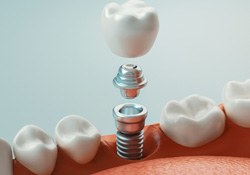
If you’re missing one tooth, we can begin to rebuild it by securing a single dental implant into the jawbone to restore the root structure. Once it has fused with the bone, we can replace the visible tooth by attaching a customized dental crown to the abutment.
This option of restoring a single gap in the smile is much less invasive and more durable than a traditional dental bridge because it doesn’t require the alteration of any of your natural, healthy surrounding teeth.
Missing Multiple Teeth
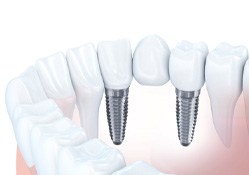
While traditional dental bridges and partial dentures are an excellent option for many patients, those who are looking for a more reliable and permanent solution to their tooth loss may prefer an implant bridge and crown combination to rebuild their smile. This approach keeps all replacement teeth securely within the mouth without having to worry about keeping track of a removable partial denture.
Missing All Teeth
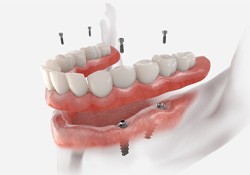
Implant dentures are highly functional and lifelike prosthetics that combine the aesthetic beauty of traditional dentures with the unmatched steadiness of dental implants that are located below the gumline. The result is a beautiful, lifelike row of teeth that are able to restore your bite power and confidence.
Learn More About Implant Dentures
Mini Dental Implants
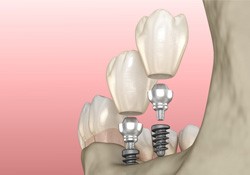
One of the basic requirements a patient needs in order to successfully receive dental implants is a strong and healthy jawbone to support the posts. However, a patient who has been missing teeth for a while might not have this due to bone degeneration. With mini dental implants, even these patients can now benefit from this state-of-the-art treatment.
As the name indicates, mini-dental implant posts are much shorter and thinner than traditional ones, requiring less jawbone structure to be successfully placed. These implants are strong enough to support an entire full denture! Plus, thanks to their reduced size, they can often be placed and restored much faster than traditional implants.
Understanding the Cost of Dental Implants
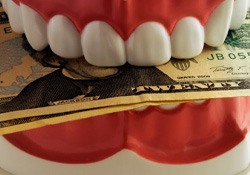
The cost of dental implants can vary significantly based on individual factors and the specific procedure required for each patient. The total expense is influenced by various aspects, including the number of implants needed and the extent of preparations necessary. Although the initial cost of dental implants may appear higher compared to other treatments, the long-term benefits are unparalleled. Dental implants have a remarkable lifespan that spans decades, eliminating the need for frequent replacements, ultimately leading to substantial cost savings, potentially saving you thousands of dollars in the long run. To learn more, simply click on the button below!
Preliminary Treatments & Dental Implant Surgery

Some patients may require preliminary procedures to ensure the dental implants fuse successfully with the jawbone and provide proper support within the mouth. Treatments like gum disease therapy, tooth extractions, bone grafting, or sinus lifts may incur additional costs for dental implants in Harrisonburg.
Once your mouth is ready to support the implants, our team will refer you to a local expert oral surgeon for the next phase. You should know that this involves its own set of costs. They’ll discuss with you separately exactly what you can expect to pay for the implant surgery.
The Parts of Your Dental Implant

The overall cost of dental implants in Harrisonburg is affected by several factors, such as:
- Number of Implants: One implant replaces a single tooth, while two may be needed for a row of teeth, and four or more for a full arch restoration.
- Type of Restoration: The type of restoration chosen, such as crowns, bridges, or dentures, affects the total price. Smaller restorations typically incur lower expenses.
- Material: Implants can be made from either titanium or zirconia, and the material used can impact the cost.
- Brand: Different implant manufacturers cater to diverse patient needs. The choice of the manufacturer will play a role in determining the final cost. Please feel free to inquire about the selected implant brand and any specific benefits associated with it.
How Dental Implants Can Save You Money

Although dental implants may have a higher initial cost compared to traditional solutions like dentures and bridges, they prove to be a superior long-term investment. While conventional restorations typically last between five and 15 years, dental implants can last for up to 35 years when properly cared for. This longevity translates to fewer visits to the dentist and eliminates the need for frequent replacement \, making dental implants a cost-effective and durable solution for your dental needs.
Does My Dental Insurance Cover Dental Implants?

You’ll be happy to know that some dental insurance plans may offer benefits that apply to specific aspects of dental implant treatment, such as preliminary procedures and restoration costs. If you have any inquiries or uncertainties about your coverage, please do not hesitate to reach out to our office. Our financial team is dedicated to assisting you in understanding any potential out-of-pocket costs you may be responsible for.
Making Dental Implants Affordable

Don’t have dental insurance? We offer additional financing options to help make your care more affordable:
- CareCredit Financing – With this option, you can split up the total cost of your treatment into smaller budget-friendly installments. There are many low-to-no interest payment plans you can choose from.
- Special Offers – Currently, you can take advantage of our free implant denture consultation. Be sure to check our website regularly to stay up-to-date on the latest deals.
Dental Implant Post-Op Instructions
If you want to keep your oral health in check after receiving your dental implants, here are a few things you can do once at home:
- In the first few days after placement, do not brush around the surgical site. After a few days have passed, gently clean the areas with a soft-bristled toothbrush.
- Instead of reaching for your regular mouthwash, opt for hot water and a teaspoon of salt. By washing your mouth with this solution, it can encourage healing. Just be sure that the water isn’t too hot. You can do this 2-3 times a day to speed up the healing process.
- If possible, try to chew on the opposite side of the surgical site and always rinse your mouth after eating.
- Apply ice or a cold compress if needed.
- Get plenty of rest.
- When flossing, you can use regular dental floss or a water flosser that pushes water out and effectively reduces plaque and inflammation.
Maintaining & Caring for Your Dental Implants

Once your dental implants are put into place, it’s likely that you’ll want to return to “business as usual.” With your regular teeth, chewing, eating, speaking, and even smiling were like second nature; however, with new, prosthetic teeth replacing those that were once missing, you might go through an adjustment phase. Yes, dental implants look and feel completely natural, but if you lived with missing teeth for an extended period of time, you’ll need to get used to the new fixtures in your mouth. You’ll also need to take the right steps to keep it looking healthy, which is why Harrisonburg Family & Cosmetic Dentistry is happy to provide tips for effective aftercare.
Make Oral Hygiene a Priority

Just like your natural teeth, it’s important to continue brushing twice a day and rinsing with mouthwash daily. Also, don’t forget to visit your dentist every six months for routine checkups and cleanings to ensure your prosthetics stay in working order and healthy.
Maintain a Balanced Diet

Implant prosthetics have the ability to restore up to 80% of your original bite power, so be sure to take advantage of this benefit by maintaining a well-balanced diet! Consuming too many carb-heavy snacks and meals can lead to an increased chance of gum disease and other oral health problems that could compromise your new teeth.
Break Bad Habits

Are you guilty of chewing on the ends of pens, using toothpicks all the time, or crunching ice? These can all put your new-and-improved smile in harm’s way. To keep your implant prosthetic functional and beautiful, try to break these bad habits by substituting healthier coping mechanisms, like squeezing a stress ball.
Protect Your Dental Implants
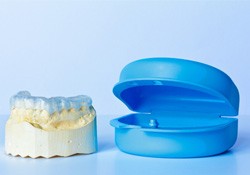
Although it might not always be easy, you should do your best to protect your new implants by investing in a custom-fitted athletic mouthguard if you play contact sports or participate in hobbies that could put your teeth at risk. It’s also a good idea to invest in a customized nightguard if you grind and clench your teeth when you sleep.
Schedule Routine Checkups & Cleanings

Once your implants are in place, it’s important that you keep your post-operative appointments with our office. Your dentist will need to check how your implants are healing as well as clean not only your teeth but the area around the implants. After completing your dental implant placement, it’s crucial that you see your dentist every six months for regular dental checkups and cleanings.
Don’t be surprised, however, if in the early stages of post-operative care, you are expected to see one of our dentists more frequently.
Dental Implant FAQs

As one of the most popular tooth replacement options today, many people still have questions about dental implants. They’re newer technology than other solutions, and they possess a unique set of benefits that you can’t get with traditional replacements. If you’re thinking about implants for your smile, we have useful answers to some dental implant FAQs in Harrisonburg.
How many dental implants do I need?
The number of dental implants that you need will directly depend on how many teeth you’re missing, your desired results, and the condition of your oral health. Sometimes, bigger teeth may even require multiple dental implants to support them, which is another variable to consider. The best way to know how many dental implants you’ll need is to contact our office for a consultation. We will carefully examine your mouth to provide the recommendation that you could benefit from most.
Does it hurt to receive dental implants?
Many people hear about the dental implant process and automatically think that it’s painful. The reality is that the discomfort you feel can be compared to a simple extraction. This is because your jawbone doesn’t contain pain-sensing nerves, which makes the placement part of the procedure more comfortable than you may think. In addition, your trusted oral surgeon will make sure you remain numb throughout your procedure.
How long do dental implants last?
Many patients choose dental implants specifically for their longevity. Because they’re made of high-quality titanium that is rooted in your bone, dental implants have the ability to last a lifetime with proper care. While their maintenance is low compared to other replacements, it’s still vital that you practice good at-home oral healthcare. You should also be sure to visit our office for routine checkups to make sure that your mouth is healthy.
Does insurance cover dental implants?
While your insurance may vary, most plans do not cover the cost of dental implants. However, certain aspects of the dental implant process like costs associated with the surgery may be covered by insurance. Our friendly and experienced team will work with you and your insurance company to minimize your out-of-pocket costs while also giving you a quality tooth replacement. We even offer financing options to allow our patients to receive the care that they deserve while remaining in their budget.

